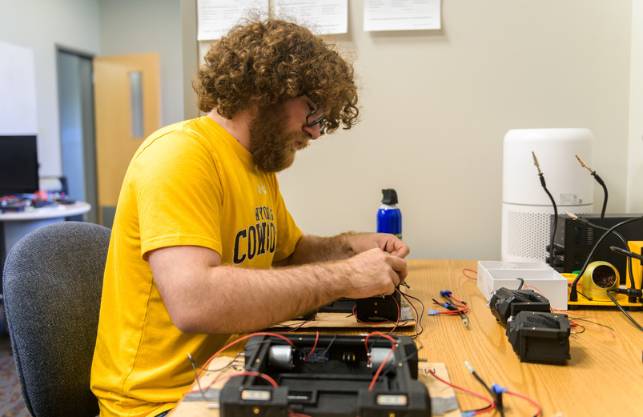Undergraduate Minors
Electrical Engineering Minor
The electrical engineering minor adds value to one’s major by equipping students with fundamental skills in circuit design, signals and systems analysis, computer logic or electromagnetic theory.
REQUIREMENTS
You must have a minimum of 12 credits of EE/BE courses that are not counted toward your major.
- ES 2210 - Electric Circuit Analysis Credits: 3
- plus a total of 20 credits of electrical engineering (EE) or bioengineering (BE) courses
Computer Engineering
Adds value to one's major by equipping students with fundamental skills needed to design, analyze, and develop computer systems for a wide range of application domains.
You must have a minimum of 12 credits of courses that are not counted toward your major.
REQUIREMENTS
- COSC 2150 - Computer Organization Credits: 3
- EE 4490 - Hardware Descriptive Language (HDL) Digital Design Credits: 3
- 17 credits of electrical engineering (EE) or CPEN Elective courses.
The following COSC courses can also be used:
- COSC 1010 - Computational Thinking and Programming Credits: 3
OR - COSC 1015 - Introduction to Programming for Data Science Credits: 3
- COSC 1030 - Computer Programming Credits: 4
- COSC 2030 - Data Structures Credits: 0
- COSC 4760 - Computer Networks Credits: 3
Computer Science Minor
Add value to your degree by learning computing including programming, databases, mobile computing, web applications, machine learning and artificial intelligence.
REQUIREMENTS
- A total of 18 credits of computer science courses
- All 18 credits must have a grade of C or better. A grade of C- is not acceptable.
International Engineering Minor
Computer Science is a global profession, and today’s computer scientists must be able to work and interact in a variety of diverse cultural and technical environments. The international engineering minor gives computer science students an opportunity to study culture and foreign language at the same time as they pursue their computer science degrees. The minor includes at least one semester of study abroad. Foreign language skills can be earned through a variety of means, including formal university coursework, intensive summer language programs, and previous education. 9 credits of lower-division coursework, and 9 credits of upper-division coursework.
Graduate Minors
Computer Science Requirements
A graduate minor in Computer Science gives you the skills and knowledge to understand how software-intensive systems are designed and implemented. With these skills, you can use computers to extend the state of the art in your major discipline.
REQUIREMENTS
12 credits are required, and must be completed with a grade of B or better.
- COSC 5110 - Analysis Of Algorithms Credits: 3
- 9 additional credits of 5000-level computer science courses
Certificates
cybersecurity certificate
The cybersecurity certificate equips students with essential skills to protect systems, data and networks in an increasingly digital world. Through hands-on practice and industry-aligned coursework, learners gain the foundational expertise needed to identify threats, strengthen defenses and support secure technology environments.


